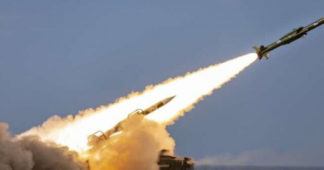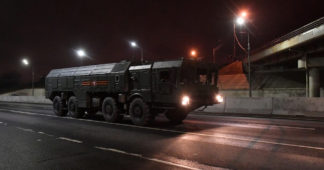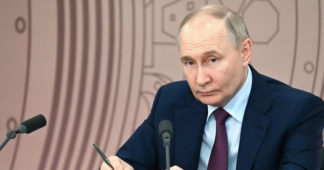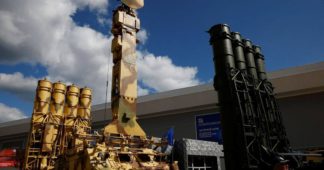Aug 3, 2024
Friday is the fifth anniversary of the Trump administration’s 2019 decision to quit the Intermediate-Range Nuclear Forces Treaty. Sputnik asked veteran US military and international affairs commentators Scott Ritter and Michael Maloof what was so significant about the INF, and why its absence has made the world a more dangerous place.
On August 2, 2019, Washington formally announced its withdrawal from the INF Treaty, untying the Pentagon’s hands to resume development, production and fielding of ground-based nuclear-capable ballistic and cruise missiles in the 500-5,500 km range.
The US justified the decision to scrap the pact on the basis of claims that Russia had an INF-violating missile (a claim Russia went to great lengths to refute). Behind the scenes, the Trump administration hoped to strong arm Russia and China into a new agreement by subjecting Beijing’s growing arsenal of intermediate-range missiles to INF-style restrictions.
Signed in December 1987 and entering into force in June 1988, the INF Treaty facilitated the liquidation of an entire class of US and Soviet nuclear missile systems, allowing Europe to breathe a sigh of relief after a decades-long Cold War.
“Things got so heated that in Germany in October of 1982, the German government collapsed because of opposition to the deployment of these American INF systems. But the systems were deployed, and the world nearly went to war,” former US Marine Corps intelligence officer and UN weapons inspector Scott Ritter told Sputnik, recalling the tense atmosphere from the early 1980s when the US deployed Pershing II and cruise missiles in West Germany.
“In 1983, in the fall, there was a NATO exercise, Able Archer, that tested the nuclear command and control, basically how NATO would launch nuclear weapons at time of war. The Soviets caught wind of this and were concerned that what was happening was NATO was getting ready for a preemptive strike, and so they put their own nuclear forces on alert. Fortunately, there was no miscalculation, mistake, misjudgment, and we dodged a bullet,” Ritter recalled.
Unfortunately, the world didn’t get a chance to ‘live happily ever after’ for long after the INF Treaty’s signature and implementation, the observer, who played a major, personal role in verifying compliance with the INF in the late 1980s and early 1990s, lamented.
Along with withdrawing from the treaty in 2019, the US added insult to injury recently by announcing the deployment of new offensive missile capabilities in Germany beginning in 2026.
“The Russians didn’t overreact. They were unhappy with this turn of events, but they said so long as the United States doesn’t deploy intermediate-range systems into Europe, Russia’s not going to build new intermediate systems nor deploy them,” Ritter said, recalling Moscow’s response to the Trump administration’s 2019 move.
“Now the United States is talking about deploying a new system, the two-stage Dark Eagle intermediate-range system with hypersonic reentry vehicles. And the Russians have said enough is enough. So now, Russia is talking about not only starting to build their own intermediate nuclear systems but deploying them. We’re back to square one. The world is a much more dangerous place today because of the actions of the United States,” the observer emphasized.
‘Sword of Damocles’ Hangs Over Europe
Former senior security policy analyst with the Office of the Secretary of Defense Michael Maloof echoed Ritter’s assessment on the implications of the US withdrawal from the INF Treaty in 2019, saying it has made the world a “more dangerous” place and put Europe especially in particularly great peril.
“The [German] leadership wants one thing, but the people are against it. The German people are against it. There have been no hearings. There has been no discussion in the Bundestag – the German parliament, about this. And yet the chancellor goes ahead and makes this decision. And it just makes the world more unsafe, particularly Europe, and makes people more vulnerable. It creates a very uneasy feeling of vulnerability, when you’re right under missiles. If hypersonics could be used, and they would be positioned to be used against Europe primarily, lead-time for warning would be virtually nil,” Maloof stressed.
In addition to going against NATO’s longstanding claims of being a “defensive organization,” Washington’s plans, in combination with the alliance’s expansion right up to the Russian border, will “create a higher degree of uncertainty, vulnerability and an unease that will be nothing but destabilizing in the long run,” the observer said, comparing the threat to a “Damocles sword hanging over your head at all times, never knowing when it’s going to drop.”
“If NATO is expanded, enlarged and reinforced the way it’s going right now, I see that the Eurasian community under BRICS and others will begin to form their own defense alliance and it’ll be through the auspices of the Shanghai Cooperation Organization,” Maloof predicted, noting that this new form of expanded security cooperation “could become a balancing act against NATO, which [also] wants to expand into the Pacific.”
We remind our readers that publication of articles on our site does not mean that we agree with what is written. Our policy is to publish anything which we consider of interest, so as to assist our readers in forming their opinions. Sometimes we even publish articles with which we totally disagree, since we believe it is important for our readers to be informed on as wide a spectrum of views as possible.











